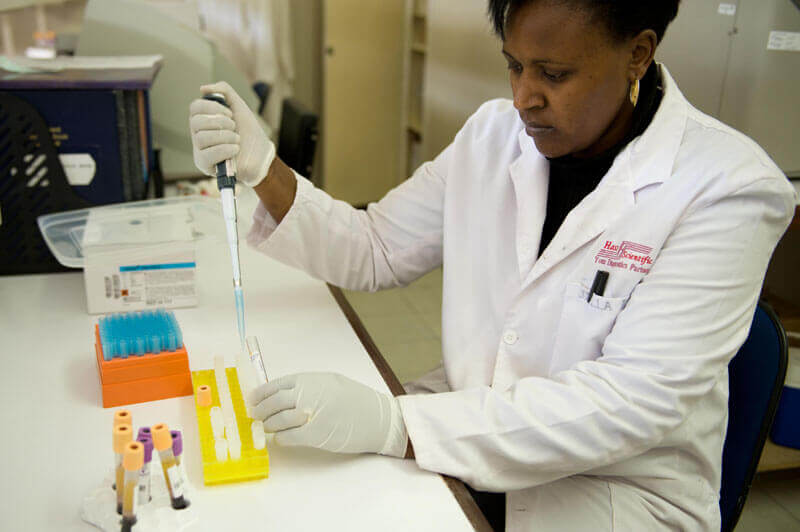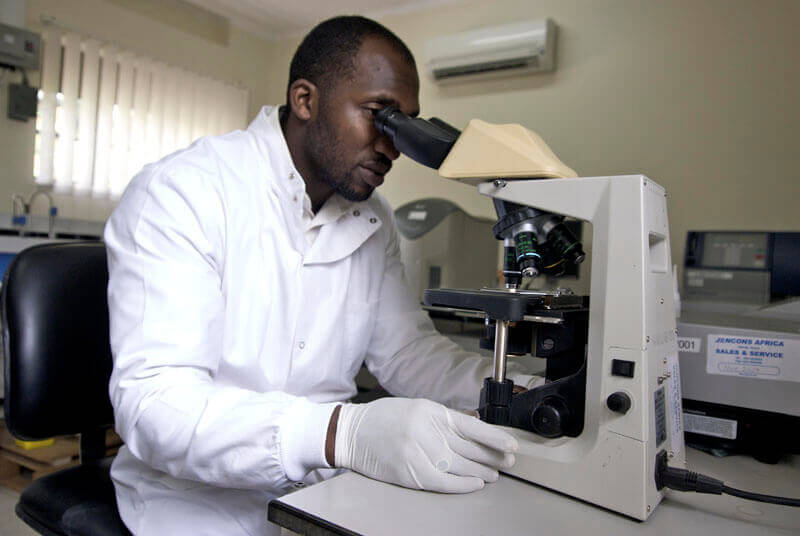In this guest post, Elisabeth Wilhelm, senior media specialist at the International AIDS Vaccine Initiative (IAVI), writes about the need to invest in the next generation of researchers and scientists in sub-Saharan Africa.
Young people in countries suffering most from the AIDS epidemic want to have their say in development decisions to fight the disease. That’s what Sydney
Hushie from the Global Youth Coalition on HIV and AIDS and fellow youth panelists stressed repeatedly during a United
Nations’ General Assembly side event at the end of September in New York. And discussions at this year’s AIDS Vaccine Conference in Barcelona reinforced the insight that it will be the young scientists of today who will drive the innovation toward vaccines—among other new
prevention technologies—that will help get to zero new HIV infections tomorrow.
Access to quality education not only can help prepare tomorrow’s HIV and AIDS scientists—it can also help them beat the odds of becoming tomorrow’s patients.
Nearly half of all new HIV infections globally occur in young adults of 15 to 24. The more education, the lower is the risk that young people will
contract HIV. They want to learn: In a study in Zimbabwe, home to the world’s seventh-highest HIV prevalence, boys and girls were very interested in
health-related issues such as HIV and sex.

- It will be the young scientists of today who will drive the innovation toward vaccines—among other new prevention technologies—that
will help get to zero new HIV infections tomorrow. Photo: IAVI/Sokomoto
The opportunities for young people to take an active role in this global fight remain as limited as their access to health care and to secondary education—as
well as their countries’ investments in science, technology, and math (STEM), especially in sub-Saharan Africa. Tanzania and Kenya have the lowest
post-secondary education rankings among 61 countries. Ghanaian students’ performance in the Trends International Mathematics and Science Study, for
example, ranked second-to-last out of 45 countries surveyed in 2003. South Africa was ranked last by the World Economic Forum in quality of math and
science education out of 62 countries.
For those students in sub-Saharan Africa who beat the odds of completing a secondary education, many end up working or studying somewhere else—and
the developing world can ill afford this “brain drain.” The World Economic Forum ranked 62 countries by their post-secondary graduation rates—Kenya
came in 41st and Tanzania 50th. Their departures aren’t surprising. The World Bank estimated that skilled workers account for only 4 percent of the
total workforce in sub-Saharan Africa, but 40 percent of those who leave their home countries. Scientists pick up and leave, too; indexes of published
peer-reviewed articles show sub-Saharan Africa’s contribution to world science production hovers below 1 percent of total global output.
IAVI and partners, such as the Kenya Vaccine Initiative and the Uganda Virus Research Institute,
collaborate to help establish research centers and implement training programs and encourage the adoption of Good Clinical Practice. In Rwanda, the
First Lady partnered with us to train young scientists in vaccine research, and across sub-Saharan Africa, we support fellowships that help local labs,
local clinicians, and scientists become experts in their fields. Their vital research propels us closer to finding an AIDS vaccine. These scientists,
together with the members of communities, offer guidance on designing clinical studies and developing vaccines that meet local needs. They also help
ensure supportive local policies and sustained local funding—because we’re in it for the long haul, too.

- IAVI and partners, such as the Kenya Vaccine Initiative and the Uganda Virus Research Institute, collaborate to help establish research centers
and implement training programs and encourage the adoption of Good Clinical Practice. Photo: IAVI/Courbet
Other organizations are also paying attention to young scientists and advocates, whom they see as an investment in the future. The Global HIV Vaccine Enterprise has taken the lead in engaging and connecting Young and Early Career Investigators at scientific conferences, and other product development partnerships
and research organizations, such as the European & Developing Countries Clinical Trials Partnership have made
expanding young scientists’ research opportunities a priority. AVAC, a global advocacy prevention group, also builds
an advocacy network to build in-country support for youth AIDS advocates.
We cannot succeed in overcoming the challenges to developing a vaccine without our many partners, representing the best homegrown talent in sub-Saharan
Africa and India. But we look to the next generation to help finish the job. Local perspectives will spur local innovations and foster new approaches
to work in the lab and in the field. We can help by promoting more in-country innovation, supporting robust STEM education, and engaging young people
earlier in academic settings throughout the Global South. The next generation of AIDS researchers could successfully bring one of human history’s most
devastating and long-lasting pandemics to a close. Let’s give them a boost.


